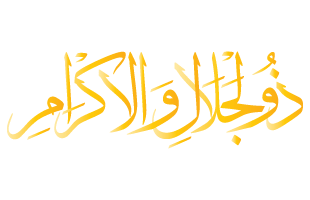ZUL JALALI WAK IKRAM/DHUL JALALI WAL IKRAM MEANING - 99 NAMES OF ALLAH:
﷽
Zul Jalali Wal Ikram / Dhul Jalali Wal Ikram
(Possessor of Glory and Honor)
Zul Jalali Wal Ikram Meaning:
Lord of Majesty and Bounty, Possessor of Might and Glory.
Allah is Zul-Jalaali-wal-Ikram (in Arabic: ذُو ٱلْجَلَالِ وَٱلْإِكْرَامُ), The One who is glorious and majestic. He is the possessor of all glory and honor. He is The One who deserves to be Exalted and not denied.

Mentions of Dhul-Jalali wal-Ikram:
From Quran & Hadith
Arabic Root:
The attributes of Allah in this phrase are based on the root of two jim-lam-lam (ج ل ل) and kaf-ra-mim (ك ر م). The meaning of j-l-l: to be supremely great to be glorious, majestic to be sublime to be high, lofty, far above, independent. k-r-m: to be noble, high minded, generous, to be highly esteemed, honored, prized, valued, to be excellent, precious, valuable, rare, to be productive, fruitful, bountiful.
You may find various translations of this name, and it stems from the interpretations of what Jalal and Ikram mean. Dhul (The Lord or Possessor), Jalal (Majesty or Glory), wal (and), Ikram, which comes from Karam (Generosity or Honor - similar to the name Al-Kareem). So, together we often see the Lord of Majesty and Honor, The Lord of Bounty and Honor, Lord of Majesty and Generosity. As a name of Allah سُبْحَٰنَهُۥ وَتَعَٰلَىٰ it is mentioned twice in the Qur'an, both times in Surah Ar-Rahman.
Wa yabqaa wajhu rabbika zul jalaali wal ikraam
English Translation:
"And there will remain the Face of your Lord, Owner of Majesty and Honor." — (Qur'an 55:27)
Tabaarakasmu Rabbika Zil-Jalaali wal-Ikraam
English Translation:
"Blessed is the name of your Lord, Owner of Majesty and Honor." — (Qur'an 55:78)
The Face of Allah:
In Surah Ar-Rahman, leading up to ayah 27, the primary focus was on the blessings of the worldly life. From 26-27, it marks the transition to the blessings of the afterlife, "Everyone upon the earth will perish, And there will remain the Face of your Lord, Owner of Majesty and Honor." Imam Bayhaqi mentions, "As for Allah's face, we affirm it is an attribute of Allah, not as a form or image." Rather wajh is often interpreted as a "face" to represent His essence of having attributes of majesty and honor.
What has also been said is the order of these two qualities. We must first recognize His Majesty, which encompasses many of His attributes, power, strength, judgment, knowledge, and absolute dominion. This could be classified as first studying and developing Taqwa (often described as God-consciousness or God-fearing piety), then we should study His grace (attributes of kindness, mercy, and forgiveness).
Reflection:
If we only realize His loving and merciful attributes, we may rationalize or be easily tempted by bad behaviors. But if we recognize His power and strength, we would avoid things out of fear of displeasing Him. This is a back-and-forth between reverence and seeking repentance from His attributes of love and mercy.
It was reported that Umar bin Khattab asked Ubayy ibn Ka'b about Taqwa. Ubay said, "Have you ever walked on a path that has thorns on it?" Umar said, "Yes." Ubayy asked, "What did you do then?" to which Umar replied, "I rolled up my sleeves and struggled." Ubayy said, "That is taqwa, to protect oneself from sin through life's dangerous journey so that one can successfully complete the journey unscathed by sin." [1]
A'isha (ra) reported: When the Messenger of Allah ﷺ pronounced salutation, he salutation longer than it took him to say: [2]
Allahumma antas salam wa minkas salam tabarakta dhal jalali wal ikram
English Translation:
"O Allah: Thou art Peace, and peace comes from Thee, blessed art Thou, Possessor of Glory and Honour"
Narrated Anas ibn Malik: I was sitting with the Messenger of Allah ﷺ and a man was offering prayer. He then made supplication: [3]
Allahumma inni as'aluka bi - anna lakal - hamd, lailaha illa ant, al - mannanu badi'us - samawati wal - ard, ya dhal jalali wal ikram! Ya hayyu ya qayyum
English Translation:
"O Allah, I ask Thee by virtue of the fact that praise is due to Thee, there is no deity but Thou, Who showest favour and beneficence, the Originator of the Heavens and the earth, O Lord of Majesty and Splendour, O Living One, O Eternal One."
There is great virtue and reward in supplicating with these names. The narration continues, "The Prophet ﷺ then said: He has supplicated Allah using His Greatest Name, when supplicated by this name, He answers, and when asked by this name He gives."
References:
[1] Muhammad Saed Abdul-Rahman (2009). The Meaning and Explanation of the Glorious Quran. MSA Publication Limited. p. 63.
[2] Sahih Muslim 592a
[3] Sahih (Al-Albani) Sunan Abi Dawud 1495

